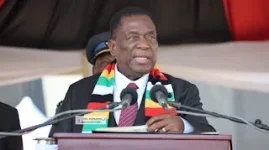Zimbabwe just cut all taxes on U.S. goods coming into the country. Money experts say this move will damage local businesses because foreign products will cost less than things made at home. President Mnangagwa announced this change on Saturday on the social media platform X. He claimed it shows that Zimbabwe wants fair trade with America. The U.S. had earlier put an 18% tax on Zimbabwean products because Zimbabwe was charging 35% on American items.
Local money expert Vince Musewe believes this kills any chance for Zimbabwe to build its factories. When things from outside cost less than making them at home, local manufacturing dies. Another expert, Chenayimoyo Mutambasere, pointed out that U.S. imports make up only half a percent of what Zimbabwe buys from other countries. Machines and farm tools top the list. Yet Zimbabwe never offered these same benefits to its biggest trading partners—China, South Africa, and India.
The problems between Harare and Washington run deeper than trade taxes. Zimbabwe owes more than $21 billion in debt, and America plays a big role in helping clear those bills. The 18% tax America still charges hurts Zimbabwean sellers right away. Last year, Zimbabwe sent $48.15 million worth of goods to America - about $4 million each month. This makes selling to America much harder because Zimbabwean products cost more than those from countries without extra taxes.
Companies must find ways to lower their costs without raising prices for buyers. If they cannot solve these basic cost issues, Zimbabwean goods might become way overpriced for American shoppers. This leads to fewer sales and lost money for businesses. Tony Hawkins, another money expert, explained that removing these taxes creates more global competition when export markets already face tough times. He called the government's decision "not very smart - just pathetic."
The changes will likely cause higher prices everywhere - both worldwide and inside Zimbabwe. The country's new currency, ZiG, will lose value. The national budget will suffer, more money will flood the market, and claims about stable prices will prove false. Hawkins expects more people will lose jobs, poverty will increase, and both local and foreign investors will pull back their money. He sharply criticized government officials like Finance Minister Mthuli Ncube and Reserve Bank Governor John Mushayavanhu, saying they "live on a different planet from the rest of us."
Local money expert Vince Musewe believes this kills any chance for Zimbabwe to build its factories. When things from outside cost less than making them at home, local manufacturing dies. Another expert, Chenayimoyo Mutambasere, pointed out that U.S. imports make up only half a percent of what Zimbabwe buys from other countries. Machines and farm tools top the list. Yet Zimbabwe never offered these same benefits to its biggest trading partners—China, South Africa, and India.
The problems between Harare and Washington run deeper than trade taxes. Zimbabwe owes more than $21 billion in debt, and America plays a big role in helping clear those bills. The 18% tax America still charges hurts Zimbabwean sellers right away. Last year, Zimbabwe sent $48.15 million worth of goods to America - about $4 million each month. This makes selling to America much harder because Zimbabwean products cost more than those from countries without extra taxes.
Companies must find ways to lower their costs without raising prices for buyers. If they cannot solve these basic cost issues, Zimbabwean goods might become way overpriced for American shoppers. This leads to fewer sales and lost money for businesses. Tony Hawkins, another money expert, explained that removing these taxes creates more global competition when export markets already face tough times. He called the government's decision "not very smart - just pathetic."
The changes will likely cause higher prices everywhere - both worldwide and inside Zimbabwe. The country's new currency, ZiG, will lose value. The national budget will suffer, more money will flood the market, and claims about stable prices will prove false. Hawkins expects more people will lose jobs, poverty will increase, and both local and foreign investors will pull back their money. He sharply criticized government officials like Finance Minister Mthuli Ncube and Reserve Bank Governor John Mushayavanhu, saying they "live on a different planet from the rest of us."












